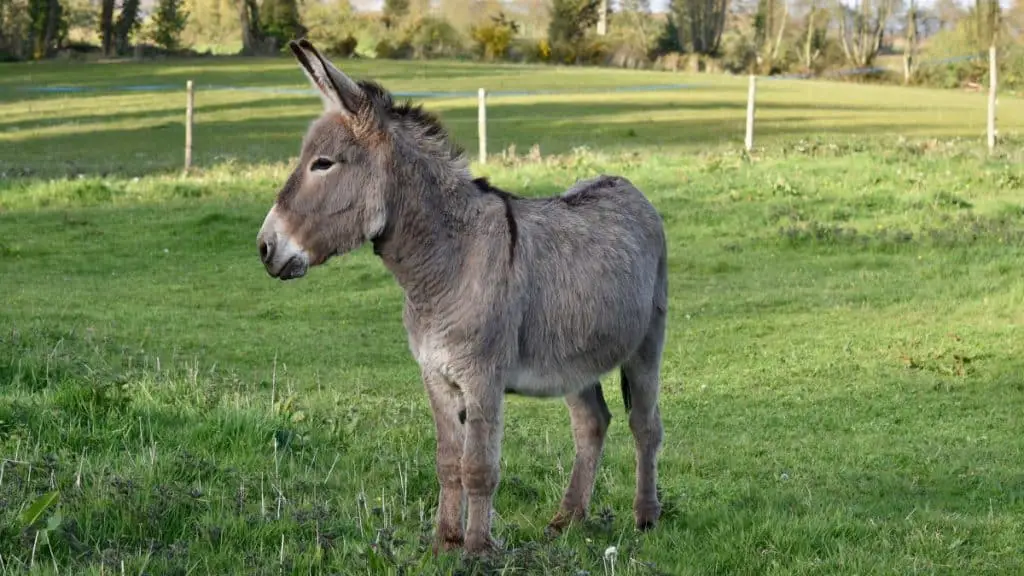Skip To Section
If you have ever asked the question “how much space does a donkey need?” then you might be surprised to learn that you can keep a donkey on 05-1 acres. You may want to divide this land up into separate paddocks, and remember that donkeys don’t like being alone.

How Much Room Do Donkeys Need?
When setting up a donkey’s home, it’s also important to think about how much indoor space the donkey needs. You should allow at least 40-50 feet per donkey. An indoor space needs to be dry, clean, and reasonably warm in winter.
According to Open Sanctuary, a pole barn is the most suitable housing for a donkey, as they are easily accessible and easy to clean. You need to make sure that the floor is not slippery, and that your donkey is not going to fall when it tries to walk, or it may injure itself.
You should not house donkeys on concrete flooring as it isn’t suitable for them. You also need to make sure that the shelter is dry and warm, as donkeys do not like standing in water.
The floor of the shelter should have a good layer of dirt to make cleaning easy and give your donkeys a soft surface to walk on. You can also add a layer of straw on top of the dirt during the winter to offer a bit of insulation and keep the donkeys warmer.
How Many Acres Do You Need Per Donkey?
You will need to assess your space in terms of the donkey’s size, needs, and the quality of the land – but around half an acre to an acre per donkey is a good rule of thumb. According to Farm And Animals, an acre is suitable for a donkey around the size of a horse.
It is better to have too much space than end up with a donkey that’s unhappy because it hasn’t got enough room. Remember that donkeys do not generally like to be kept alone, so you should aim to have a pair of donkeys at least.
That means you need an acre of land at least to keep standard donkeys in most circumstances. Remember that a donkey’s living space is its exercise space as well as its dinner plate; it needs enough room to move around.
Having this much space means that you should always have plenty of grass for them to graze on, and you can divide the land up without leaving them cramped, unable to roam sufficiently.
You may want to divide up your land into sections so that your donkeys can graze on different bits at different times. This will allow you to rotate the grazing area and ensure that your donkeys don’t end up eating all the grass or wearing it down, and having nowhere to go.
Fence off areas of your land and ensure each part is given time to rest and recover after your donkey has grazed it. Ideally, each area needs to join onto the donkeys’ shelter, or have a route to it so that they can go in whenever they need to.
Rotating your pasture allows you to keep your ground healthy, remove any unwanted plants that may be trying to grow in the grass, and deal with donkey manure. Ideally, pastures should be kept graze-free for around three months at a time.
What else should you include in your donkeys’ living space? They should always have access to a mineral lick, as this will ensure they are getting the nutrients that they need.
Fresh water is also a must-have. Every area that you use needs a water supply that can be kept clean so your donkeys have access to a drink at all times.
This is particularly important in summer, but you will also need to check water isn’t frozen in winter.
Next, you should provide your donkeys with hay at all times; they need the roughage, and will supplement the rich grass with this tougher, fibrous food, in order to stay healthy. You should keep this in a net so that they eat it more slowly.
Donkeys also enjoy toys. They are intelligent animals and will benefit from having things to do, even if they have space and playmates. If they are low on space or socialization, toys become even more important.
Donkey Wise offers some great ideas for donkey toys, such as equine balls or rubber buckets. They also make suggestions on how to hide treats so your donkeys have to puzzle out how to get them, or how to make obstacle courses to enrich your donkeys’ space.
Make your donkey enclosure a haven for them that has everything they could need – in all areas of the paddock (or rotate as you rotate their space).
Can I Keep A Donkey In My Backyard?
Obviously, this will depend enormously on your backyard. If it is paved, small, and lacks foliage, definitely not.
However, if you have a large, greenery-filled backyard, possibly yes. According to Animals Mom, donkeys are amazing at getting out of enclosures, so you’ll need to make sure you have a pretty secure backyard if you plan to do this.
A miniature donkey is the most likely to be suitable for keeping in your backyard. These are considerably smaller than standard donkeys, and therefore do not need as much space for roaming or grazing.
It’s still crucial that you make the space comfortable, provide a good shelter, and add plenty of enrichment activities to keep your donkey happy and engaged. Remember that it’s better to keep donkeys in pairs, so you really do need a fair-sized backyard to be able to do this.
Conclusion
As a good rule of thumb, donkeys require half an acre to an acre of space. They also need a good shelter, a salt lick, toys, hay, water, and secure fencing with well-fastened gates!
If you can provide all those things as well as companionship, your donkeys will be extremely happy and live healthy lives. They will also bring you a lot of pleasure, as they are amazing, intelligent, and loving creatures that form strong bonds with their owners.
